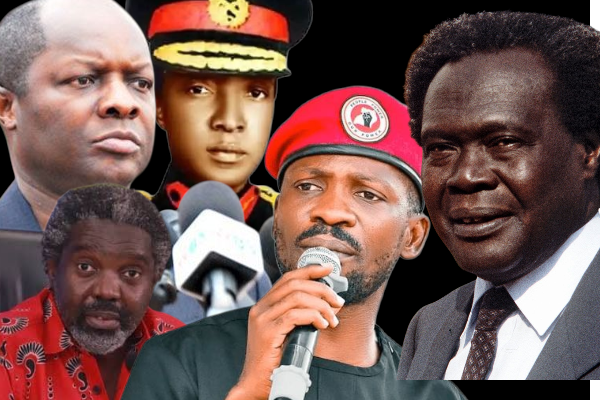BY ANDREW BABA
Bobi Wine’s homage to Obote is not just political theater—it’s a tragicomedy of betrayal, a slap across the face of Buganda’s historical wounds wrapped in a velvet glove of national unity.
If the spirits of our ancestors could speak, Ssekabaka Edward Mutesa II would be rattling in his grave—not from the cold English soil that once held his remains, but from the chilling irony of his own bloodline kneeling before the grave of the man accused of orchestrating his downfall. Robert Kyagulanyi Ssentamu, alias Bobi Wine, the self-styled ghetto president and grandson of the Mbogo clan, has done what no Muganda of sound memory would dare: he kissed the political ring of Apollo Milton Obote, the man whose legacy is etched in Buganda’s darkest chapter.
In a move that would make even Shakespeare’s Brutus blush, Bobi Wine laid an Ugandan flag on Obote’s grave in Apac District, praising the former president and calling for a re-evaluation of his legacy. “We’ve been fed lies,” he said, as if Mengo’s archives were mere bedtime stories. One wonders—who exactly lied? Was it Mengo, the seat of Buganda’s cultural authority? Or was it the blood-soaked history that saw the Lubiri bombarded, the Kabaka exiled, and the kingdom reduced to a footnote in Obote’s republic?
Let’s rewind the tape. In 1966, Obote, with the cunning of a fox and the ruthlessness of a lion, turned on Kabaka Mutesa II after a political fallout that began with a fragile alliance. The Lubiri was attacked, the Kabaka fled to London, and Uganda was declared a republic in 1967. Mutesa died in exile under suspicious circumstances, and his remains were only returned after Obote’s own fall from grace. The Baganda never forgave him. When Obote’s remains were returned in 2005, protests erupted. “A good Muganda is a dead one,” Obote was quoted to have said—a phrase that still echoes like a curse in Buganda’s collective memory.
And yet, here comes Bobi Wine, the prodigal son of Buganda, not with a sword to defend his heritage but with a bouquet of praise for the man who dismantled it. If irony were a currency, Bobi Wine would be richer than Museveni’s campaign coffers.
The silence from Mengo is deafening. But silence, as they say, is not consent—it’s the sound of a kingdom holding back its fury. Bobi Wine’s flirtation with Jimmy Akena, Obote’s son and UPC president, is not just a political alliance; it’s a symbolic handshake over Mutesa’s grave. Akena himself has vowed to “clear his father’s image,” a mission that seems to begin with cozying up to Buganda’s own grandson.
But Bobi Wine’s history with Mengo has always been rocky. From his refusal to attend Kabaka Ronald Muwenda Mutebi’s birthday celebrations to his party’s criticism of the Katikkiro Charles Peter Mayiga’s development initiatives, the National Unity Platform has often danced to a tune that sounds more like discord than unity. In contrast, President Museveni—despite his own complicated legacy—facilitated the return of the Buganda Kingdom in 1993 and has maintained a working relationship with Mengo, often appearing alongside the Kabaka and Katikkiro in public functions.
Museveni may be many things, but he knows the value of symbolism. Bobi Wine, on the other hand, seems to have traded symbolism for shock value. His alliance with Akena is like inviting a hyena to guard the goat pen. It’s political hindsight dressed as foresight, a betrayal wrapped in the rhetoric of national healing.
The Baganda are watching. And they’re not amused. For a people whose identity is deeply tied to their kingdom, Bobi Wine’s actions feel like a cultural divorce. The ghetto president may have won hearts in Kamwokya, but he’s losing souls in Mengo. His praise for Obote is not just tone-deaf—it’s historically blind.
One can imagine Kabaka Mutesa II whispering from the beyond: “Ettofaali lyange lyaagwa mu mazzi,” my bricks fell into the water. The legacy he built, the kingdom he cherished, now finds its very descendant kneeling before the architect of its destruction.
In Buganda, history is not just remembered—it’s lived. Every child knows the story of the Lubiri attack, the exile, the poisoned king. To praise Obote is to spit on that memory. Bobi Wine may argue that he’s promoting unity, but unity without truth is just a masquerade.
So what now? Will Mengo speak? Will the Baganda forgive? Or will Bobi Wine find himself politically orphaned by the very kingdom that birthed him?
As the 2026 elections loom, Bobi Wine must choose: does he stand with the ghosts of Buganda or dance with the shadows of UPC? Because in politics, as in life, you can’t serve two masters. And in Buganda, betrayal is never forgotten.


